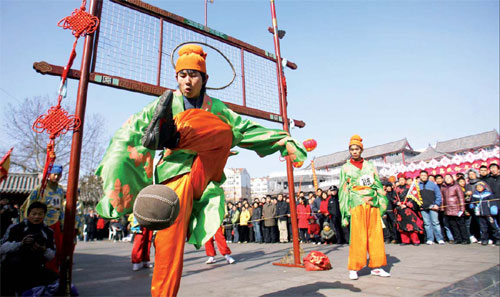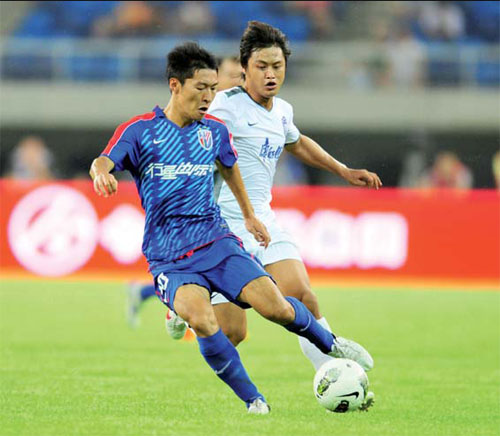Did soccer originate in China?
Updated: 2012-08-17 07:39
By The World of Chinese (China Daily)
|
||||||||
|
A cuju show in Qingdao, Shandong province, attracts audiences. Some people believe cuju is the precursor of modern soccer. Photos provided to China Daily |
Popularity of ancient sport points to modern similarities
Who invented soccer? It is a debate that has raged among aficionados of the beautiful game for years. Whilst the rules for the modern-day format are less than 200 years old, the origins of the sport are far older. According to Sepp Blatter, president of Federation Internationale de Football Association, it is China that can lay claim to its invention, with Linzi, the capital of the ancient Chinese state of Qi, the designated birthplace.
Though the Chinese Football Association was only founded in 1924, centuries before, the nation had a thriving sport going by the name of cuju (蹴鞠), which literally translates as "kick ball with foot".
Evidence, revealed in ancient poetry and two hefty historical tomes, describes a game being played as early as the Warring States Period (476-221 BC) that has striking resemblances to the modern game. Two opposing teams kicking a ball (stuffed with feathers and hair) around a pitch, trying to keep possession and attempting to score before the other team dispossessed them. Sound familiar?
Even referees were employed to officiate the strict no hand-ball policy. Though it was still a far cry from the present-day counterpart (the traditional flogging of the losing team's captain might seem a little excessive in the Barclays Premier League), the fundamentals were certainly there.
Cuju was as popular then as football is now, transcending both class and gender. At first, during the Han Dynasty (206 BC-AD 220), it was considered an effective military exercise for keeping soldiers fit, teaching the intricacies of defense versus attack, and getting rid of numb legs after a hard day's riding.
It soon caught the attention of the upper classes and the game was staged as entertainment during imperial banquets.
Emperors were so taken with the sport that being a skillful cuju player could even be a ticket to the good life. A young man named Gao Qui, for example, is reported to have asked to play for a future emperor in the 12th century, and his fancy footwork impressed so much that he was appointed to a string of increasingly important jobs in the army, eventually rising to defense chief.
It was an early victory for feminism too, as the traditional moral concepts restricting Chinese women were relaxed for cuju. Some became professional and, according to records, a 17-year-old girl once beat a team of soldiers.
The game evolved throughout consecutive dynasties and even spread to Japan, South Korea and Vietnam. But concluding that cuju was the original form of soccer is not so straight-forward. It ultimately faded during the Ming Dynasty (1368-1644), leaving a tenuous connection to the modern game.
Some historians claim the basic idea traveled to the West via the Silk Road, spreading out to Egypt, Rome, France and the rest of the world. Cynics, however, are quick to point out that kicking a ball with your feet is not a particularly groundbreaking concept, with other versions played by ancient Egyptians, ancient Greeks, and the Romans.
FIFA sounds pretty convinced of China's claim though, explaining on their website that cuju is "The very earliest form of the game for which there is scientific evidence." This provocative statement should perhaps be taken with a pinch of salt though, as it was announced at the Third Football Expo in Beijing to a lucrative and soccer-mad market.
It seems the origin of soccer is a sensitive subject that will receive continued debate for years to come. But even if China cannot prove soccer originated in China, it still has plenty more sports to lay claim to. The 10th century stick-and-ball sport chuiwan (捶丸) has been declared by some historians to be an early incarnation of golf, whilst jiju (击鞠), the Tang Dynasty (AD 618-907) pastime involving horses and mallets, developed into polo.
Courtesy of The World of Chinese, www.theworldofchinese.com
|
Chinese football players compete. A skillful cuju player could be highly valued by emperors in ancient China. Photos provided to China Daily |
(China Daily 08/17/2012 page19)

 Relief reaches isolated village
Relief reaches isolated village
 Rainfall poses new threats to quake-hit region
Rainfall poses new threats to quake-hit region
 Funerals begin for Boston bombing victims
Funerals begin for Boston bombing victims
 Quake takeaway from China's Air Force
Quake takeaway from China's Air Force
 Obama celebrates young inventors at science fair
Obama celebrates young inventors at science fair
 Earth Day marked around the world
Earth Day marked around the world
 Volunteer team helping students find sense of normalcy
Volunteer team helping students find sense of normalcy
 Ethnic groups quick to join rescue efforts
Ethnic groups quick to join rescue efforts
Most Viewed
Editor's Picks

|

|

|

|

|

|
Today's Top News
Chinese fleet drives out Japan's boats from Diaoyu
Health new priority for quake zone
Inspired by Guan, more Chinese pick up golf
Russia criticizes US reports on human rights
China, ROK criticize visits to shrine
Sino-US shared interests emphasized
China 'aims to share its dream with world'
Chinese president appoints 5 new ambassadors
US Weekly

|

|








